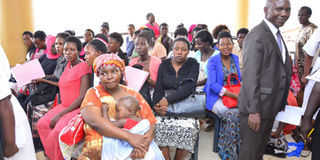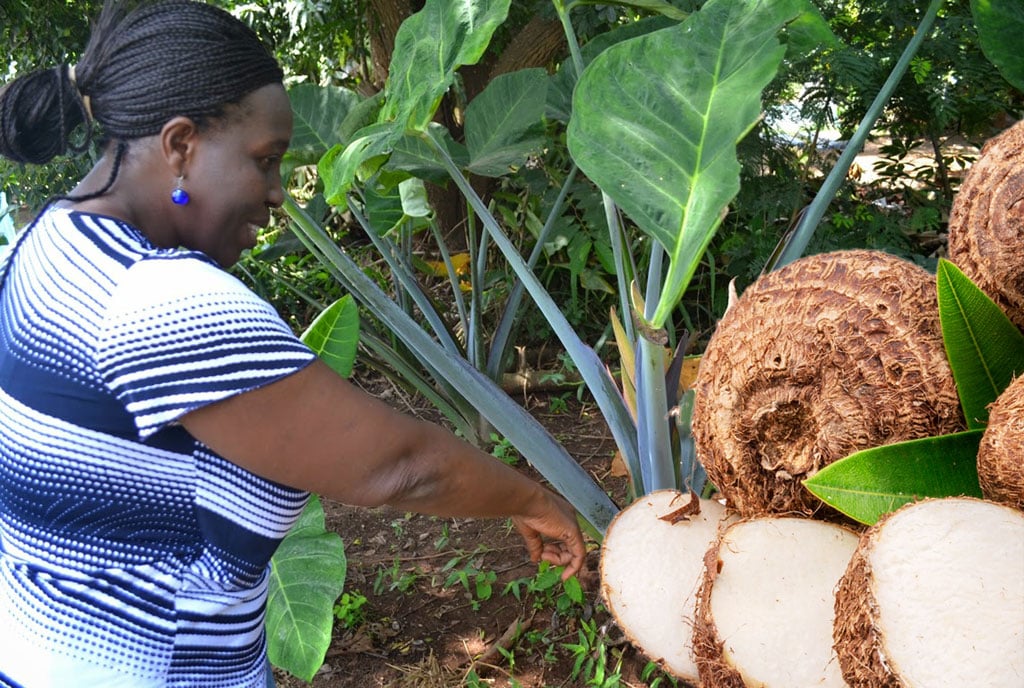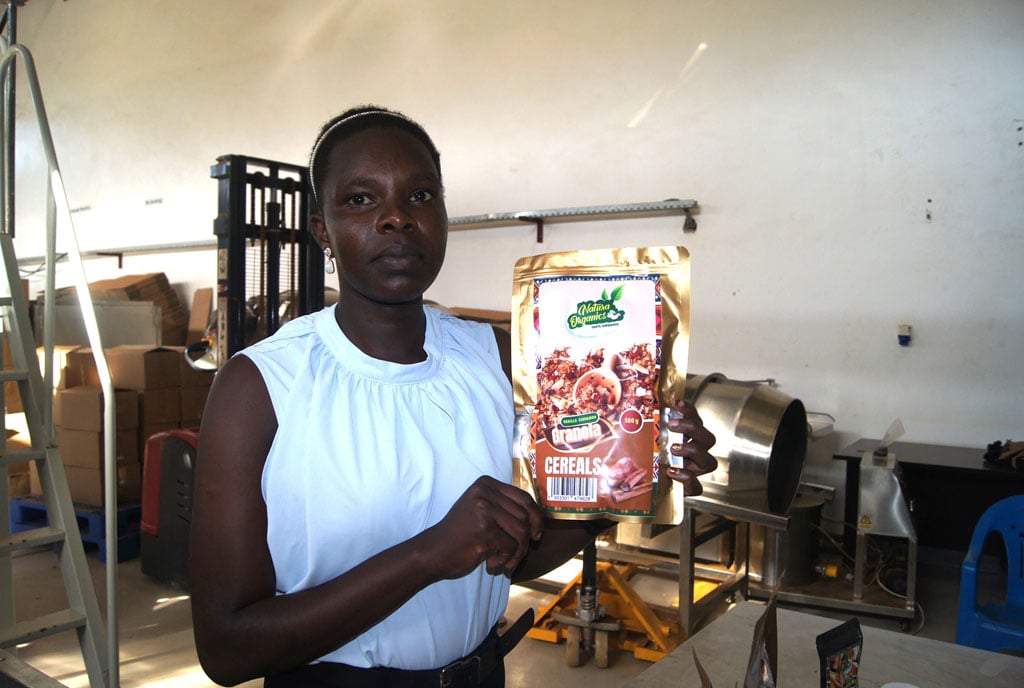What could kill you during pregnancy?

Expectant mothers queue for antenatal care at Mulago Hospital. It is critical for pregnant women to seek regular medical attention. Photo by Eric Dominic Bukeny
One of the most amazing miracles is the miracle of bringing a new life into the world. From the moment a woman discovers that she is carrying a life inside her, their life changes forever; they are smitten, consumed by the baby. For the urban woman, reading material is devoured, counsel sought, incredible amount of time spent on shopping for the baby in preparation for a new life.
No woman ever wants to believe that this magic promise could be the cause of their own death. Yet, there are many things that could kill an expecting woman; from intensifying of pre-existing conditions, difficulties during delivery to something as normal as morning sickness. So what is most likely to kill an expecting mother?
Post-partum hemorrhage
Doctor Dennis Sozzi, an obstetrician/ gynecologist at Lifelink Medical, explains that while motherhood is risky all round, rural mothers have specifically different complications from their urban counterparts.
“Most pregnancy complications for rural mothers are a result of lack of or poor maternity care while in urban centers, mothers are often affected by hypertensive disorders,” he explains.
He points out obstetrician and post-partum hemorrhage as a leading cause of death for mothers from rural areas.
“Picture a pregnant mother in a rural area who gives birth at home and experiences heavy bleeding probably due to the womb’s failure to contract properly. Fortunately, the birth attendant admits failure and refers the patient to the health centre.
By the time she is admitted at the health centre and is fortunate enough to be seen by a doctor, she will have lost enough blood to endanger her life,” Dr Sozzi adds. Fatality due to loss of blood occurs when an individual loses 40 per cent of their blood.
Annette Kyomugasho, mother of five, is one of the fortunate women who have survived a post-partum hemorrhage. She narrates that the incident happened after delivering her second born. “I had an easy labour and delivered naturally. However, this happy turn of events changed when six hours later, I was still bleeding. The midwife advised me to wait patiently but kept monitoring. By morning, I had lost too much blood; I was too weak to talk. I will never know how the doctor knew, but he took me back to the operating room and retrieved a piece of gauze that had somehow found its way inside and was stopping the healing process,” Kyomugasho narrates. She recovered soon after.
Protracted labour
Another major killer for expecting mothers in rural areas according to Dr Sozzi is protracted labour or the failure of the cervix to dilate at a normal rate. Normally labour should not go beyond 18 hours but some doctors can stretch it to 20 hours. “When labour goes into 24 hours, it endangers both mother and child as it not only weakens the mother but has severe effects on the child,” he says.
Pre- eclampsia
While rural mothers are affected by lack, their urban counterparts are struggling with hypertensive disorders which include pre-eclampsia, fluid retention (oedema or swelling) and protein in the urine.
Nancy Nakate, 45, mother of two, (names have been slightly altered) reveals that she has so far lost two babies to the condition. “Every time the choice to save my own life breaks my heart and haunts me for months afterwards, but I console myself that I am living for my two children,” she confesses.
Nakate recollects that she had gained weight due to the pregnancy to which she used to attribute the difficulty in breathing.
One day, she woke up feeling dizzy and nauseated. By 10am the condition had worsened and she was admitted to hospital where an emergency delivery was done. “When it happened the second time, I felt as if my world was falling apart, but my husband kept assuring me that I had made the right choice,” she adds.
Doctor Herman Sewagude, an obstetrician and gynecologist at Seven Hills Hospital, says pre-eclampsia is becoming a growing menace to pregnant women. The condition, which usually develops after 20 weeks of gestation for reasons not fully understood, has no known cause. “On a given day, I treat a minimum of two patients with pre-eclampsia. Most of them have what we term as mild pre-eclampsia which we manage by keeping blood pressure as low as possible until delivery. But in cases of severe pre-eclampsia there is usually no other option but to deliver the baby,” Dr Sewagudde explains.
Dr Sozzi further explains that as a physician, he has had to deal with so many of these cases and it is always a very difficult decision when you have to tell the mother to choose between her own life and that of her unborn baby. “Most certainly they always choose to give the baby a chance even after explaining how fatal the condition is. They have sentimental attachments to the fetus such as being their first boy or being their last chance or have received an ultimatum from their spouse to not dare lose the baby. In the face of all these threats, they choose to go full term even after assuring them that the baby can survive at 28 weeks,” he says. One is advised to be under close monitoring of their doctor.
HELLP Syndrome
Another hypertensive disorder is HELLP syndrome. This is a combined blood clotting and liver disorder that can affect pregnant women. The letters in the name, HELLP, stand for each part of the condition’ Haemolysis (red blood cells in the blood break down), EL (elevated or raised liver enzymes) and LP (low number of platelets in the blood, which affects the blood’s ability to clot). The only way to treat the condition is to deliver the baby. The main danger to the baby is if it is premature or if the mother becomes extremely ill.
Ectopic pregnancies although rare, are extremely fatal. Doctor Sewagude, describes an ectopic pregnancy as one where the baby develops in another place instead of the womb. The commonest ectopic pregnancies occur in the fallopian tubes but embryos can also implant in the connection between the ovaries and the uterus. These places were not fashioned to support a pregnancy so when the embryo grows it will most definitely rupture them leading hemorrhage which if not contained can become fatal,” Dr Sewagudde explains.
Doctor Zdravka Anusic, a Gynecologist at Kampala Independent Hospital, points out a condition termed as maternal depletion syndrome which affects women who get pregnancies too close together.
“Because the mother lacks important nutrients such as iron and folate, she is vulnerable to anemia and other complications such as uterine rupture because the uterus is not given enough time to recover its tautness. After several pregnancies, the uterine muscles could fail to contract after delivery, which is the most common cause of postpartum hemorrhage,” Dr Anusic elaborates. To avoid this condition, mothers should learn to space their pregnancies by at least two years apart to allow the body to heal. There are so many methods of family planning that a woman can choose from; talk to your doctor to find what suits your life style properly.
Blood clots
Blood clots are another silent killer. Dr Sewagudde explains that they form in blood vessels usually in the legs or/and lungs can break away, causing a blockage elsewhere, for example in the lungs (pulmonary embolism or PE – a blood clot in the main artery of the lung) which can be fatal.
Sepsis
Dr Ssozi further reveals that Sepsis is an infection that occurs during or after pregnancies. He cites Urinary Tract Infections which is severe especially when it spreads into the blood stream. Whenever you feel like you have an infection, talk to your doctor. Most of these infections can be treated with antibiotics.
Anemia
Pregnant women are more prone to anemia due to the excess amount of blood the body produces to help provide nutrients for the baby. If not properly replaced through food or supplements, the normal number of healthy red blood cells will be severely depleted. Treating the underlying cause of the anemia will help restore the number of healthy red blood cells.
Women with pregnancy related anemia may feel tired and weak. This can be helped by taking iron and folic acid supplements. In addition, you can eat foods rich in iron like red meats, poultry eggs, leafy green vegetables, nuts, seeds and beans.
Hypertension
Chronic poorly-controlled high blood pressure before and during pregnancy puts a pregnant woman and her baby at risk for problems. It is associated with an increased risk for maternal complications such as preeclampsia, placental abruption (when the placenta separates from the wall of the uterus), and gestational diabetes. These women also face a higher risk for poor birth outcomes such as preterm delivery, having an infant small for his/her gestational age, and infant death. To manage high blood pressure, Dr Anusic advises expecting mothers to eat a healthy diet with limited sodium intake and to faithfully take blood pressure medications the way you are supposed to.
Gestational Diabetes Mellitus (GDM)
GDM is when the body cannot effectively process sugars and starches (carbohydrates), leading to high sugar levels in the blood stream. Most women with GDM can control their blood sugar levels by a following a healthy meal plan from their health care provider and getting regular physical activity.
Eating a wide variety of foods, including whole grains, fruits (with skin on), vegetables, and dairy products, will give you the carbs you need. High-fiber or low-glycemic foods will help keep blood sugars more even and help you feel full longer, as well. Some women also need insulin to keep blood sugar levels under control.
Severe morning sickness
“While nausea or vomiting, usually known as “morning sickness,” is expected during the first trimester, it becomes fatal when it becomes severe and persistent,” explains Dr Sewagudde.
Nausea and vomiting during pregnancy is caused by rapidly rising blood levels of a hormone called HCG (human chorionic gonadotropin), which is released by the placenta. If left untreated it can lead to weight loss and dehydration and may require intensive treatment.
What can be done
Dr Anusic suggests talking to your doctor about health problems you have now or have had in the past when you get pregnant so that you are properly managed. “Once these conditions are managed well, there is no reason why you should not have a normal, healthy baby,” she adds. She further cautions women against delaying medical consultation whenever they spot any bleeding, feel drowsy or any unexplained pains.
She suggests other precautions as:
•Routine blood and urine control
•Daily salt reduction in nutrition
•Regular pressure control
•Regular ultrasound control
Scary numbers
According to statistics from ministry of health, Uganda has a maternal mortality rate (MMR) of 343 deaths per 100,000 live births from any cause related to or aggravated by pregnancy or its management (excluding accidental or incidental causes). An alarming 16 women die daily from pregnancy related complications. This rate puts Uganda on the 37th position on rankings of countries with the highest MMR in the world. Globally, Mary Beth Powers, Save the Children’s chief of the Child Survival Campaign states that one out of seven women will face complication during pregnancy.




